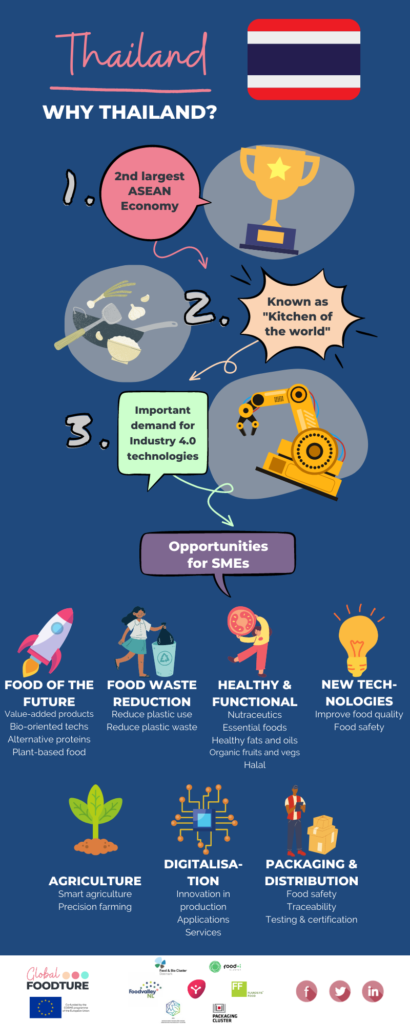
Did you know… Thailand?

Thailand represents the second largest ASEAN economy. The country was ranked 35-40th most competitive nation in a list of 140countries.
The food industry represents 23% of Thailand’s GDP, proving its importance in the economy. It’s called the “kitchen of the world” and it’s known as one of the world’s leading agricultural suppliers and one of the ten key growth engines. Thailand has developed advanced technologies related to the food industry, such as freeze drying and packaging technologies.
Thailand developed a 4.0 policy, is involved in BCG economic development, EEC projects and in the ASEAN «bio-hub“.
A growing topic of interest is related to the digital sector. Thailand has developed the digital and IT sector due to an important demand for robotics and automation, IOT, big data, cybersecurity. E-marketplaces are quite developed and established. Local population is importantly digitalized. E-commerce is growing due to this aspect.
International commercial activities are supported by different free-trade agreements (RCEP and ASEAN trades with South Korea and Japan) and there are tax advantages for investors. Today, there is no Free-trade agreement established with EU countries. Identified constraints to cite for Thailand are the currency instability, corruption levels, Royal strict laws, and regulations.
The main priority topics addressed by our Thai partners are: smart agriculture, precision farming, health and functional foods (nutraceutical potential, nutrition and essential foods, healthy fats and oils…), value-added food products (organic fruits and vegetables, halal), bio oriented technologies, alternative proteins, plant-based food, innovation of the production chain, packaging and distribution (digitalization, food safety, traceability, testing and certification, technological development, etc.), technologies to improve food quality and safety, traceability, development of the IT and digital sector: development of applications and services, food waste reduction and solutions to reduce plastic use and plastic waste.
Global Foodture is preparing a series of trainings and master classes to better understand the four projects targeted regions Japan, South Korea, Singapore and Thailand.


